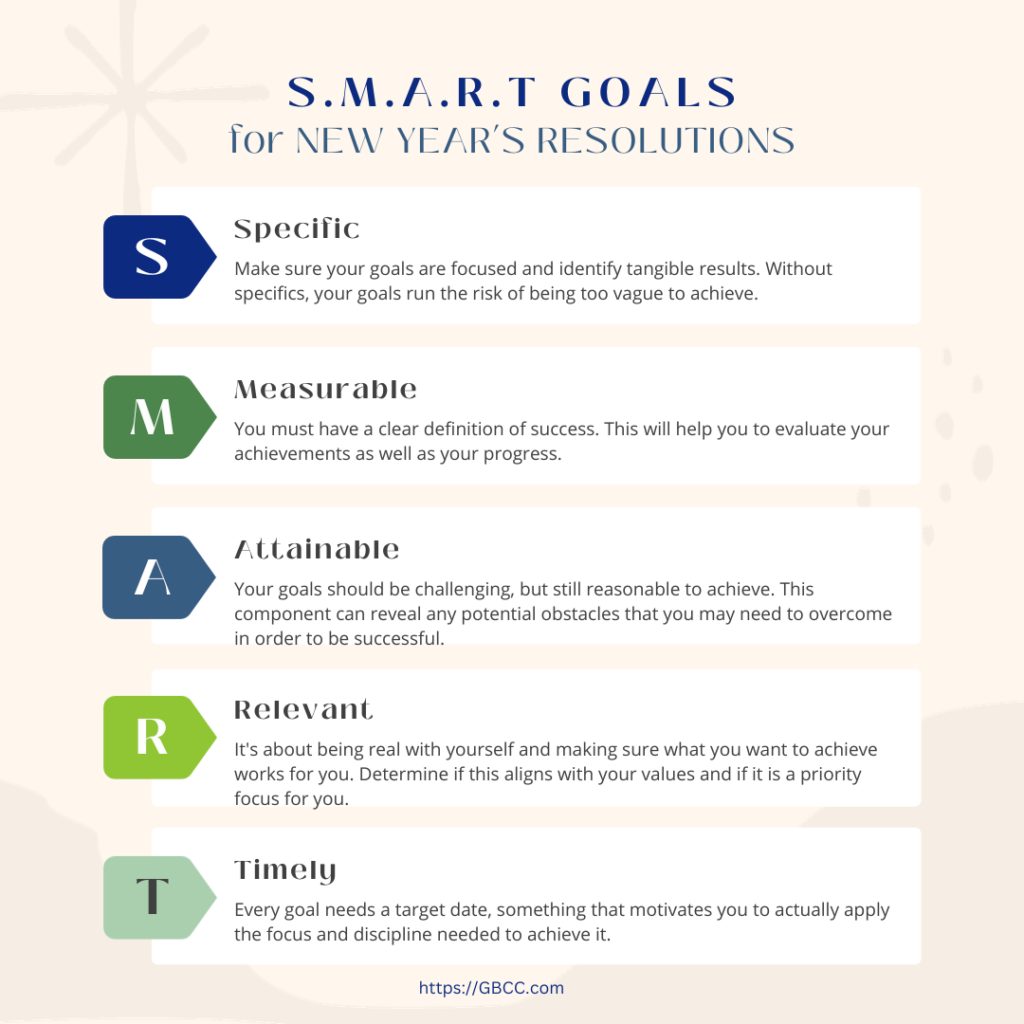Positive Resolutions or Unrealistic Expectations?
New Year’s resolutions, while often well-intentioned, can inadvertently become taxing to one’s mental health for various reasons. The pressure to set ambitious goals and achieve instant transformation can lead to unrealistic expectations, setting individuals up for feelings of inadequacy and self-criticism. Rather than fostering positive change, the weight of unattainable expectations may exacerbate existing mental health challenges, emphasizing the importance of adopting a mindful and compassionate approach to goal-setting that prioritizes well-being over external pressures.

For those struggling with mental health concerns, there’s a way to approach the new year with intentionality and self-compassion by creating SMART goals. In this blog post, we’ll explore the concept of SMART goals and discuss how they can be a game-changer for those looking to make positive changes while managing their mental health.
Understanding SMART Goals
SMART is an acronym that stands for Specific, Measurable, Achievable, Relevant, and Time-bound. This framework provides a structured and realistic approach to goal-setting, which can be especially beneficial for individuals navigating mental health challenges. Let’s break down each component:
1. Specific: Define your goal with clarity. Instead of a vague resolution like “be happier,” consider a specific goal like “practice mindfulness for 10 minutes daily” or “engage in a hobby I enjoy at least twice a week.” Specificity helps to focus your efforts and provides a clear direction.
2. Measurable: Establish criteria to track your progress. Measurable goals allow you to tangibly assess your achievements. For instance, if your goal is to exercise regularly, set a measurable target like “walk for 30 minutes five times a week.” This way, you can track your success and adjust your efforts accordingly.
3. Achievable:Ensure that your goal is realistic and attainable. Acknowledge your current circumstances and set goals that are within your reach. If you’re working on improving your sleep, an achievable goal might be “establish a consistent bedtime routine,” rather than aiming for perfection in sleep duration immediately.
4. Relevant: Align your goal with your values and priorities. Consider how your resolution contributes to your overall well-being. If social connections are important to you, a relevant goal might be “schedule a weekly video call with a friend” to foster connections and support.
5. Time-bound: Set a deadline for your goal. Establishing a timeframe creates a sense of urgency and helps prevent procrastination. Instead of saying “exercise more,” set a time-bound goal like “complete a 30-day yoga challenge” or “run a 5k in three months.”
A Gentle Approach to Mental Health
When dealing with mental health concerns, it’s crucial to approach goal-setting with self-compassion and flexibility. Here are some additional tips to make the process more manageable:
1. Start Small: Begin with small, manageable goals. Gradual progress is still progress, and starting with achievable steps can build confidence and motivation.
2. Be Flexible: Life is unpredictable, and mental health journeys can have ups and downs. Be open to adjusting your goals as needed, recognizing that flexibility is a strength, not a weakness.
3. Seek Support: Share your goals with a trusted friend, family member, or mental health professional. Having a support system can provide encouragement, accountability, and a non-judgmental space to discuss your progress.
4. Celebrate Achievements: Acknowledge and celebrate even the smallest victories. Recognizing your accomplishments, no matter how minor, fosters a positive mindset and reinforces your commitment to personal growth.
Conclusions: Prioritize Your Mental Health In the New Year
As you embark on the journey of setting New Year’s resolutions, remember that your mental health is a priority. Embrace the SMART goals framework to create a roadmap that is realistic, focused, and compassionate. If you need help to set SMART goals, reach out to schedule an appointment with a licensed therapist. By adopting a gentle approach to self-improvement, you can navigate the challenges of the new year with resilience and a commitment to your well-being. May this year be one of growth, self-discovery, and nurturing the relationship you have with yourself.
